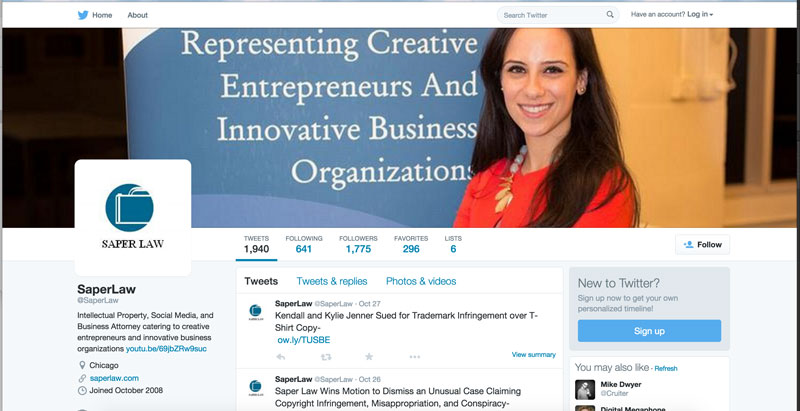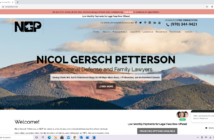Intellectual property and entertainment clients steadily flow into this innovative young lawyer’s growing practice.
Television news producers in Chicago and beyond know that if they want a catchy sound bite about cyber bullying, sexting, revenge porn, or just about anything else concerning Internet or entertainment law, they‘ll get it from Daliah Saper. From her position at the helm of a Chicago firm, Saper Law, that she launched a decade ago when she was fresh out of law school, Saper has been interviewed on air “countless” times, and has a highlight reel on her web site to show for it. In one clip, a news anchor exclaims, “You’ve always got a great way of breaking it down for us.” In another snippet, Saper displays her knack for doing just that in a segment about a popular social media site’s ban on porn. The site now has “a no nipple, no problem policy,” Saper quips.
The media appearances have given her a very high profile, and have helped her land a steady stream of what she describes on her firm’s web site as “headline grabbing clients and cases.” A less flashy but no less important part of her marketing strategy – giving seminars before trade groups or in a conference room at her law office – have brought in enough other work from business clients that she has taken on two associates in the last several years. Meanwhile, she has been named a Superlawyers Rising Star for the past seven years in a row. Saper has done it all, she says, “without spending any money on advertising.”
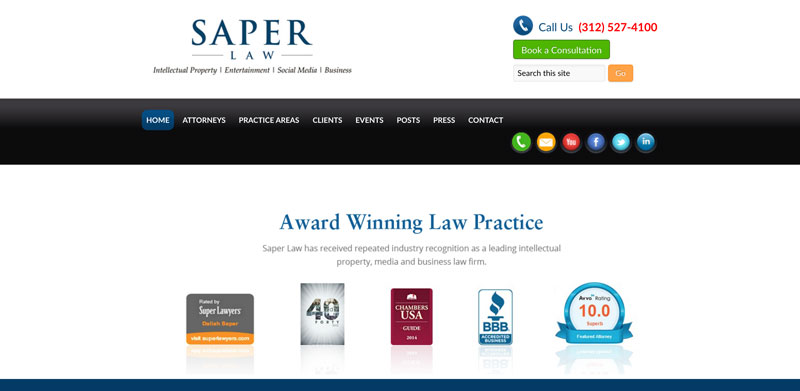
Pro Bono Work Was the Gateway
When she launched her firm at the age of 24, less than a year after graduating from the University of Illinois Law School and long before she became a television personality, Saper says she spent much of her time working free of charge. “I got a lot of pro bono cases from Lawyers for the Creative Arts.” That didn’t lead to paying work, at least not directly, but it was “the best way for me to get some actual experience in the space I wanted to focus on, which was anything involving trademarks and copyrights, or entertainment in general.” It also helped assure, she says, “that I could be more confident when I was trying to pitch business to clients who had the same issues and the financial means to pay me for the work.”
For an attorney just starting out, handling cases pro bono is also “one way to get your name out there, but it’s not the only way,” Saper says. “For me, the better way to promote myself has been speaking and events. My very first paying clients came from guerrilla marketing–going to events and telling people what I do. If you go to enough events, eventually someone will ask you to do something for them.”
Saper adds, “Now I don’t really have to do any actual soliciting. People find me. But at first I reached out to them. I would say, if you ever need a speaker on a topic, I’d be happy to do it. Or people would attend a seminar in my office and ask me to do it somewhere else.”
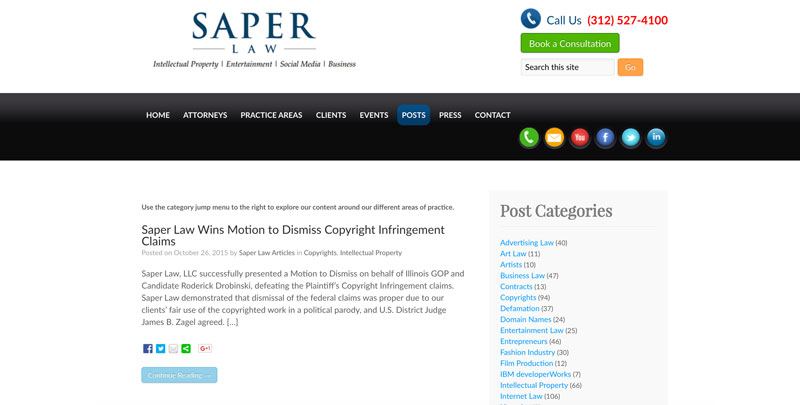
Giving Seminars to Reach Prospective Clients
One recent seminar that got her in front of lots of potential clients was on music licensing at an event co-sponsored by the Illinois Restaurant Association and Broadcast Music, Inc., a firm that represents 700,000 songwriters, composers and publishers. “That was pretty well attended and quite controversial,” Saper says. “They may not realize it, but restaurants and venues have to pay licensing fees to performance rights organizations for the music that they play. Many of the business owners came to vent about the fact that they have to pay.
She is scheduled to give another talk about social media and intellectual property law at a symposium sponsored by the Illinois CPA Society. “I think it’s helpful to partner with other organizations so you can expand your database,” says Saper, who takes down names everywhere she goes. “I try to give monthly seminars. If I’m not speaking somewhere else, I try to do something at my office. I will notify everyone I have met at events, and I go to a lot of events where I can network with people, and I add them to my database. As often as I can, I send out newsletters and I will usually announce my seminars that way.”
Her firm has been an official sponsor of some of the events she has attended, including the annual Midwest Independent Film Festival, where she gave a presentation with a title that was sure to draw a crowd, “Hello, You Owe Me a Million Dollars.” More recently, she sponsored a Startup of the Year Competition and Mixer put on by a long-time client called Tech.Co, a media company and events organizer for entrepreneurs.
Sponsorships of that sort “show that you’re involved in your community and that you are partnering with people in your community, and I think that’s important,” Saper says. “But I try not to sponsor without speaking. Just being on a poster board doesn’t really do anything for you. Sponsorships really need to be tied to the individual, so you have to be present at the events that you sponsor.”
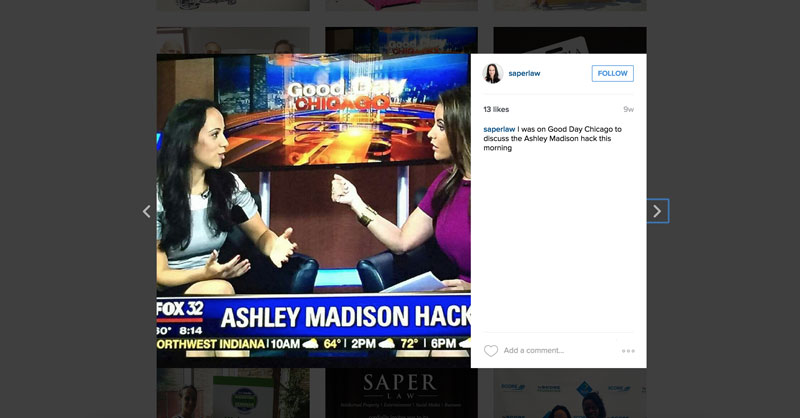
The Art of Delivering TV Soundbites
Though she is perfectly comfortable with public speaking and schmoozing, the television appearances took some getting used to, she says. “The first time I did it, my heart was pounding. It was live so there was no room for error. But I’ve done improv in the past, and I knew the subject matter. That mitigates some of the nerves, and of course the more you do something like that, the easier it gets.
“The last time I got nervous, they called me to speak about a celebrity who overdosed on drugs. It involved a criminal law matter that I’m absolutely not qualified to speak about, but because I did not want to lose my position as the first law firm they call, I agreed to do it,” Saper says. “I knew just enough to speak for three minutes, which is all they needed. If you get the high-level bullet points, you can speak on just about anything on TV. Nobody’s asking for in-depth analysis. I’ve gotten pretty good at distilling a complicated issue to bite-sized quotes.”
Saper became the go-to attorney for TV producers by chance. “My first television appearance was quite out of the blue. It was related to a defamation matter. The reporter was cold-calling defamation attorneys and found something on my website — I think a YouTube video from a local cable access show. Then I got another call from a national network that was doing a piece on Facebook. From then on, I was in the roster, so I kept getting called. A couple of years later, I took a headline-grabbing case to the Illinois Supreme Court.” Her client had been the victim of an elaborate Internet hoax by a woman pretending to be a needy cancer patient. “After that, I received media inquiries from all over the planet, from Japan to England, and of course from all the different outlets here in Chicago.
“I have often joked that I should start a PR firm because I have contacts at almost every media outlet. I’m not really proactive. I could be but usually I wait for them to call me. Whenever there is a case in the headlines involving Facebook or other social media or any sort of tech issue, I get a call,” says Saper.
Mixing with Clients on Social Media
In addition to being a social media commentator and litigator, Saper is a heavy user of the full gamut of platforms, and is convinced that it helps her practice. “If there is one space where I can actually monetize my return on investment of time, it is definitely social media. My Facebook page is open all day long, and I actually engage with and keep up with a lot of my clients from their Facebook pages. They will message me on Facebook instead of emailing or calling me,” she says. She is also a fan of Twitter and Instagram, where she posts photos of herself on TV, with celebrities she has represented and, most recently, bicycling in a tutu across the desert floor at Burning Man. Her firm’s YouTube home page, meanwhile, holds a collection of media reels or her TV appearances, as well as client testimonials, most of which she records at parties that her firm occasionally hosts for clients and guests.
“Wherever small business owners are actively promoting their businesses, that’s where I want to be, and usually that’s Twitter or Facebook. While they’re in there, they’ll say, ‘Oh, let me send a message to my lawyer who I know is always on these sites as well.’”

Burnishing Credentials
Saper has taken several other steps during her decade in practice to, as she puts it, “credentialize” herself in the eyes of potential clients, sometimes by doing things that otherwise wouldn’t necessarily by worthwhile. Teaching sports and entertainment law as an adjunct professor at Loyola University Chicago School of Law, is one example.
“It is not very lucrative but I’ve been doing it for six years. So I have most of the material and I can walk to the law school from my office,” she says. “I enjoy it, and it’s a credentializer. It keeps you fresh and it maintains your status as an expert in the area of law you are teaching. Clients like to see that you’re not only practicing but also an academic, even though I’m not really.”
The fact that her firm accepts payment in Bitcoins, a decision announced with some fanfare in a 2013 press release, is another example. “Saper Law Offices prides itself on being on the forefront of all things new and technological! Accordingly, we are proud to announce that our office now accepts Bitcoins as a form of payment,” the press release began.
Since then, says Saper, “I’ve had a whopping two people pay me in Bitcoin. A third tried but ended using PayPal. But it has been a good way to show I am capable of that. Most people aren’t. A client in that space maybe has Bitcoins and even though they don’t necessarily want to use them, they know that at least I know what they’re talking about. It helps brand the firm even if most clients don’t avail themselves of the opportunity. It’s another of those credentializers.”
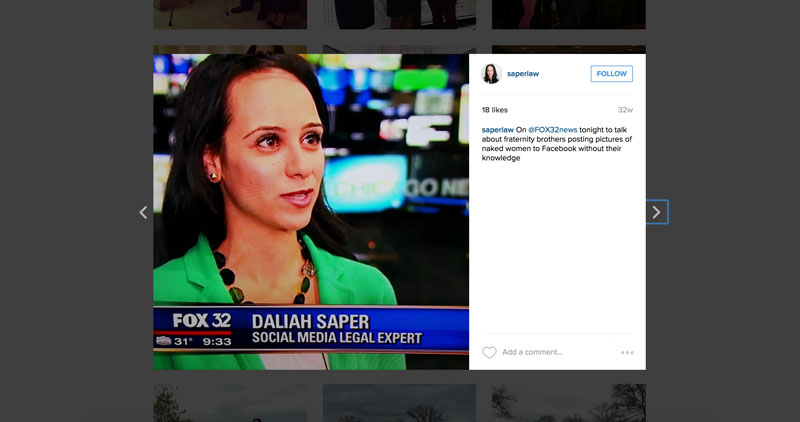
Don’t Expect Quick Results
For those who have just launched a law practice, Saper advises, “Don’t underestimate the power of your own immediate network. Most of the people who hire you will hire you not do so necessarily because they think you’re qualified, although of course you have to demonstrate competence. They will hire you because they like you.”
She adds, “You want to be distinguishable from everyone else who does what you do. You have to really spend time thinking about what your personal brand is. You have to be able to explain what is unique or interesting about your law firm. If 62 law firms can process your trademark application, why should they use Saper Law instead of somebody else?” she says. “You also have to work on your messaging to make sure people understand exactly what you do. Your first target market should be the people in your network and the people you hang out with socially, or because you have to engage with them for other reasons.
“It’s not an overnight thing. It has taken me 10 years to build my network. There is no quick way to get the phone to ring. You have to work at it. It really builds slowly over time. It is not for people who are impatient.”

